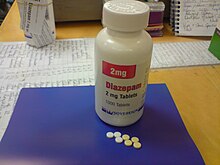Our website is made possible by displaying online advertisements to our visitors.
Please consider supporting us by disabling your ad blocker.
Benzodiazepine withdrawal syndrome
| Benzodiazepine withdrawal syndrome | |
|---|---|
| Other names | Benzo withdrawal |
 | |
| Diazepam is sometimes used in the treatment of benzodiazepine withdrawal.[1] | |
| Specialty | Addiction medicine, Psychiatry |
| Symptoms | Anxiety, irritability, panic attacks, paranoia, tremor, akathisia, dissociation, confusion, insomnia, sensory disturbances, seizures |
| Complications | Seizures, suicide, hyperthermia, psychosis, delirium, catatonia, psychological trauma, death |
| Duration | Average: ~2 months |
| Causes | Stopping or reducing intake of benzodiazepines in a state of dependence |
| Prevention | Gradual dose reduction |
| Benzodiazepines |
|---|
 |
Benzodiazepine withdrawal syndrome (BZD withdrawal) is the cluster of signs and symptoms that may emerge when a person who has been taking benzodiazepines as prescribed develops a physical dependence on them and then reduces the dose or stops taking them without a safe taper schedule.
Typically, benzodiazepine withdrawal is characterized by sleep disturbance, irritability, increased tension and anxiety, depression, panic attacks, hand tremor, shaking, sweating, difficulty with concentration, confusion and cognitive difficulty, memory problems, dry mouth, nausea and vomiting, diarrhea, loss of appetite and weight loss, burning sensations and pain in the upper spine, palpitations, headache, nightmares, tinnitus, muscular pain and stiffness, and a host of perceptual changes.[2] More serious symptoms may also occur such as depersonalization, restless legs syndrome, seizures, and suicidal ideation.
Benzodiazepine withdrawal can also lead to disturbances in mental function that persist for several months or years after onset of symptoms (referred to as post-acute-withdrawal syndrome in this form).
Withdrawal symptoms can be managed through awareness of the withdrawal reactions, individualized taper strategies according to withdrawal severity, the addition of alternative strategies such as reassurance, and referral to benzodiazepine withdrawal support groups.[3][4]
- ^ Cite error: The named reference
pmid28328330was invoked but never defined (see the help page). - ^ Petursson, H. (1994). "The benzodiazepine withdrawal syndrome". Addiction. 89 (11): 1455–9. doi:10.1111/j.1360-0443.1994.tb03743.x. PMID 7841856.
- ^ Onyett, SR (1989). "The benzodiazepine withdrawal syndrome and its management". The Journal of the Royal College of General Practitioners. 39 (321): 160–3. PMC 1711840. PMID 2576073.
- ^ Ashton, Heather (1991). "Protracted withdrawal syndromes from benzodiazepines". Journal of Substance Abuse Treatment. 8 (1–2): 19–28. doi:10.1016/0740-5472(91)90023-4. PMID 1675688.
Previous Page Next Page
متلازمة انسحاب البنزوديازيبين Arabic Síndrome d'abstinència de les benzodiazepines Catalan Síndrome de abstinencia de las benzodiazepinas Spanish نشانگان ترک بنزودیازپین FA Bentsodiatsepiinivieroitusoireyhtymä Finnish Syndrome de sevrage aux benzodiazépines French ベンゾジアゼピン離脱症候群 Japanese Benzodiazepin-abstinens NB Simptomi prestanka uzimanja benzodiapina SH กลุ่มอาการขาดยาเบ็นโซไดอาเซพีน Thai


